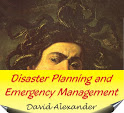In recent years there has been increasing interest in trying to understand the intersectionality between war and other forms of disaster. The other forms are natural hazard impacts (please do not call them ‘natural disasters’ as they, too, are largely the result of human agency), technological failures, social movements (riots, crowd crushes, unplanned mass migrations, etc.), intentional disasters (essentially terrorism) and composite events. Such is the complexity of modern life that the last of these categories predominates. We live in networked societies and disasters tend to be events with cascading consequences.
In recent days, vast numbers of women, children and the elderly have crossed international boundaries as they have fled the fighting in Ukraine in what has become Europe’s fastest mass migration since the 1940s. As a result, we have a humanitarian emergency that encompasses primarily Ukraine itself and six countries on its western borders but potentially the whole of Europe. In Ukraine the challenge is to provide basic necessities under highly dangerous conditions and via an infrastructure that is becoming more and more damaged and fragmentary. Outside Ukraine it is a matter of accommodating hundreds of thousands of refugees, most of whom come from families that have been split up by the war.
Gone are the times when war was fought on a battlefield between assembled armies. There is no room any more for a Napoleon or a Wellington. In modern warfare everyone and everything is a target. Grain, fertiliser, gas, oil and minerals are casualties as well as people, and so are those who depend on these commodities and are deprived by shortage or rising prices from accessing them.
In a world that faces grim challenges in dealing with climate change, ecological catastrophe, loss of the carrying capacity of the land and problems with the vulnerability of technology, the last thing we need is a major war. Nothing can compensate for the loss of life and destruction of people’s living conditions that it causes, but it may yet accelerate the transition towards more sustainable consumption and more rational ways of living. Amid the lies and manipulations that lie behind the aggression, there is also solidarity and rationality. Let us hope that in spite of everything these admirable qualities will prevail. We need them so that we can confront the next disaster.

